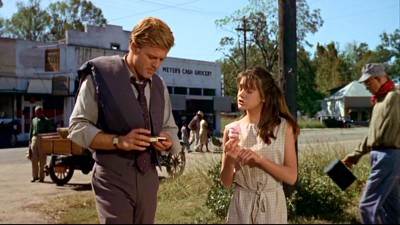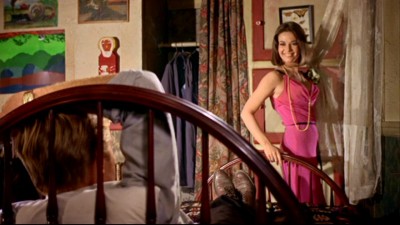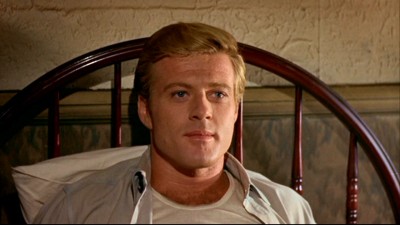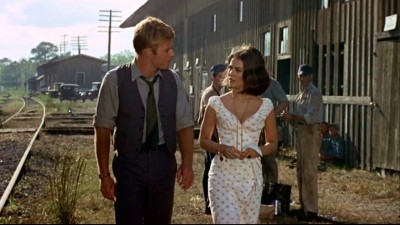| Reviews & Columns |
|
Reviews DVD TV on DVD Blu-ray 4K UHD International DVDs In Theaters Reviews by Studio Video Games Features Collector Series DVDs Easter Egg Database Interviews DVD Talk Radio Feature Articles Columns Anime Talk DVD Savant Horror DVDs The M.O.D. Squad Art House HD Talk Silent DVD
|
DVD Talk Forum |
|
|
| Resources |
|
DVD Price Search Customer Service #'s RCE Info Links |
|
Columns
|
|
|
This Property Is Condemned (Warner Archive Collection)
Tennessee Williams presents...Petticoat Junction! Warner Bros.' Archive Collection of rare, hard-to-find library and cult titles has re-released (relax...I'm not going to say anything) This Property is Condemned, the 1966 Paramount Pictures drama from director Sidney Pollack, starring Natalie Wood, Robert Redford, Charles Bronson, Kate Reid, and Mary Badham. An obvious, woefully superficial outing that satisfied neither critics nor audiences at the time (it's never a good sign when the source material's author wants his name off the movie), This Property is Condemned hasn't improved any with age, with its cornball doomed romanticism, its glossy, bland phoniness (a Pollack trademark), and its laugh-out-loud finale coming over more like very bad William Inge rather than somewhat bad Tennessee Williams. Oh, well...at least Wood and Redford are pretty to look at. No extras for this sharp widescreen transfer.

The Depression. Dodson, a hard-scrabble railroad town in hot, humid Mississippi. Dirty, unkempt teen Willie Starr (Mary Badham) walks along the train track adjacent to her boarded-up, condemned home--the Starr Boarding House--when she happens upon Tom (Jon Provost), another teen out flying a kite. Falling off the rail, Willie is helped by Tom, after which she proceeds to tell the story of her beautiful sister, Alva Starr (Natalie Wood). Flashing back in time, mysterious, handsome stranger Owen Legate (Robert Redford) arrives by train in Dodson and meets Willie and her loud, brassy mother, Hazel (Kate Reid), securing a room at the Starr where a drunken party, paid for by lodger Mr. Johnson (John Harding), is in full swing. Kate is anxious for Alva to keep the married Mr. Johnson company, knowing a flush sucker when she sees one. Alva, on the other hand, is more interested in Legate, whom she promptly spots, ditching amorous railroad worker Sidney (Robert Blake) in the process. Fending off the unwanted advances of her mother's boyfriend, J.J. (Charles Bronson), Alva eventually makes her way up to Legate's room...who proceeds to call her out as a whore, an insult that may or may not be true, and one that infuriates her. Once everyone discovers why the mysterious Legate is in town--he's a railroad "spotter" who chooses the workers who are to be laid off--he's decidedly unpopular with everyone but dreamer Alva, who senses an opportunity in Legate to leave podunk Dodson behind and head off to mythical New Orleans.


One of the least-effective big-screen adaptations of a Tennessee Williams work, This Property is Condemned is a frustrating, ultimately empty exercise in pulled dramatic punches, uninspired direction, and central miscasting. Based on a 1946 one-act piece Williams wrote inbetween far more important major plays The Glass Menagerie and A Streetcar Named Desire, it's difficult not to surmise that the only reason this relatively marginal Williams property was developed in the first place was 1) Hollywood queen Natalie Wood needed a ready-made "serious" work to help balance out the increasingly banal crap she found herself in at this perilous stage of her career, and 2) most of the playwright's better works had already been adapted for the screen by 1965, and it was too soon to remake them. By 1965, Wood was in trouble, both personally and professionally. Having achieved a genuine breakthrough, under the careful guidance of director Elia Kazan, with her remarkable performance in 1961's Splendor in the Grass, Wood had slowly started to slip back into increasingly safe, commercial fare that may have solidified her position as one of Hollywood's elite with increasingly big, fat paychecks, but which did little to reassure the jittery, anxious star that she wasn't living on borrowed time with the critics and the public. A child/young adult star with iconic movies on her resume like Miracle on 34th Street and Rebel Without a Cause, Wood's personal appeal with audiences somehow allowed her to survive subsequent junk like The Burning Hills, Bombers B-52, Kings Go Forth, Marjorie Morningstar, All the Fine Young Cannibals, and Cash McCall, before Wood rescued her career with the one-two punch of commercial hit West Side Story and critical smash Splendor. However, Wood quickly headed right back into the marshes with increasingly inept offerings like Sex and the Single Girl, Inside Daisy Clover, and The Great Race, culminating in the disastrous 1966 comedy, Penelope, where Wood was largely held responsible for that expensive flop's failure. A star whose private life was often as troubled as her financially profitable-but-personally unsatisfying movie career (Wood even tried to commit suicide during the filming of This Property is Condemned), it's no surprise that when This Property is Condemned was released to a chorus of bad notices and anemic ticket sales, Wood retreated from moviemaking for three long years--an eternity in terms of a movie star's career trajectory--effectively ending her days as a producer's first-choice, A-list performer (her 1969 return, Bob & Carol & Ted & Alice was also her last big hit...but she didn't carry it).


Miscast Wood certainly isn't the only thing wrong with This Property is Condemned. Almost nothing works right in the movie, from the script, to the production, to the direction. Written by Francis Ford Coppola (really just starting out), Fred Coe (more suited to television and the stage), Edith Sommer (she would find her metier in TV soaps), and frequent Sydney Pollock script doctor David Rayfiel lending an assist, This Property is Condemned's script is the worst kind of faux-approximation Tennessee Williams...minus, incredibly, the poetry and the steam and the sweat and the corrosive, turbulent, sublimated emotions that we come to rightfully expect in his projects. Where is This Property is Condemned's heat? Where is its poetry of despair made heart-rending by Alva's mask of self-delusion? What we have instead are fractured storylines like poor Mary Badham's Willie and her aborted friendship with Redford (she's hacked completely out of the center of the movie), Redford's supposedly tortured/cynical RR "spotter," and Reid's pimping mother, intercut willy-nilly between "is-she-or-isn't-she-a-slut?" Wood trying to sound beatific about the mythical joys of Maris Gras and New Orleans. None of these tangents are given proper development, while the characters' dialogue is frequently hackneyed and even puerile (these three excellent actors try mightily, but their efforts are scuttled from the get-go). Crucially, the movie's take on Alva and sex have been so cautiously scaled back--a result not only of the Code's last vestiges of influence here in 1965, but also, I would imagine, the star's reluctance to play an out-and-out whore--you don't know what end is up...including Miss Wood's absolutely insane derriere. Has Alva really screwed all those guys, as her mother says? Maybe...but the movie plays it both ways so we have to wonder. Why does she marry Bronson? We can guess...but the movie gives her no logical motive for that rather rash action...nor an illogical, emotional one, either. Does she really become a hooker in New Orleans, as one suggestive shot seems to indicate? Probably (where else did she get the money to hang out there for awhile, waiting to meet Redford?)...but the movie never says it, and Wood plays it as if she would never do that. One only has to look to other Williams screen heroines, such as earthy, voluptuous Elizabeth Taylor or Ava Gardner, to see how plain the moviemakers made it--with the Code over their heads, too--where their characters stood on sex (they loved it). But not here; instead, we're left with a coy "maybe/maybe not" attitude towards Wood's character that doesn't titillate as much as it insults in its vague, careful, non-offensive pose.


The physical production and Pollock's direction are equally neutered: how the hell did these guys fail to capture the humid, fetid atmosphere of low-down, drunken, mean-spirited Depression-era Mississippi that's absolutely vital to the story? Where's the verisimilitude of the hornier, sweatier aspects that we've come to expect in a Williams' project? As it plays out here, in too-glossy color and too careful production design, I don't believe for a second that this "Dodson" exists as a town...even if they did shoot on location somewhere in Mississippi. I don't believe Blake and Bronson as RR workers (Blake in particular is embarrassing as he sniffles and scurries around the baseboards). I don't believe gentile, boring Alan Baxter as their boss (that guy wouldn't have lasted two seconds on the Depression-era rails). I don't believe that too-well groomed, too modern-looking Redford is really a "spotter" for the railroads (just like I didn't believe him in The Sting). I don't believe those big, over-lit sets are really a rooming house. And I don't believe Natalie Wood is panting and heaving to leave there (the production is so inept, they don't even mist her to simulate the sweat she would surely have in all that heat she's complaining about). Nothing here feels gritty or grimy or authentic; it's a synthetic, Hollywood studio vibe that you can lay squarely at the feet of director Pollock, a mid-level, "tasteful" director (in the absolute worst sense of that word) whose movies now look increasingly more anonymous and lightweight as the years go on.


These numerous miscalculations and misdirections are serious, potentially fatal, blows to This Property is Condemned's overall success. However, a knockout central performance from an actress truly in tune with the Alva character could have mitigated some of the damage--a futile hope once we're introduced to inexplicably bright, chipper Wood. In Splendor, director Elia Kazan immediately spotted the troubled waters beneath Wood's confident Hollywood glamour and quite rightly thought it would be intriguing to see those neuroses of hers burst through the dam of perky normalcy. Wood's own personal repressions as an actress were correctly exploited there, but those same hesitancies, married to her sometimes brittle, annoyingly Hollywoodized "star wattage," is exactly what isn't needed in This Property is Condemned. Not only can't she handle the faux-Williams doggerel about isolation and longing and dreaming (she often sounds like a kid in a high school play, dutifully reciting her lines like a good little girl), she can't elevate herself to that level of Williams-esque self-delusion that's absolutely necessary for her character. We need an actress here who's on another level, who's occupying a realm of fantasy that's constantly in danger of crashing down from the weight of her squalid reality. She needs to be operating clearly "outside" the ken of the lowlifes that are trying to grub around her, and Wood simply can't deliver that. That's not Natalie Wood. We don't buy her flights of fancy, her plaintive aches for adventure, and we don't believe for a second that sardonic, cynical Redford (he's very good here, with what little he's given) would be "bewitched" by anything in Wood other than her enticing, even exceptional, body. The moviemakers even get that wrong: those skin-tight dresses are too well-crafted, too well fitted on that sleek, pampered, glossy Bel Air body to be believable as a hot and bothered Mississippi white trash tramp lost in reveries about sinful New Orleans. Jesus Christ--can we get a wrinkle or a gap in that material? How about a little smudge on that perfectly manufactured Max Factor face? Can we not sit there and constantly wonder if there's cantilevered rigging holding up those perfect breasts? It's all too ridiculous.


Wood does score when she's allowed (once here) to be openly, believably sexual, when she's nursing an injured Redford, breathing, "Tell me, tell me..." over and over again as she moves her sinuous body onto his. That's when Wood's rather remarkable latent, potent sexuality is simultaneously dreamy and palpably electric (too bad somebody couldn't have convinced the terminally inhibited Wood to do what Jane Fonda did, and work in more explicit European art films--Wood could have reinvented her career). Her drunken confrontation scene with Reid and Bronson is excellent, as well--Wood is sexy as hell throwing daggers at those who have used her--but the fact that she had to actually get drunk to shoot the scene pretty much says it all for her suitability in this movie. Surrounded by excellent actors who manage to intrigue us even with the mostly misguided dreck they've been given to work with (Badham is so good in her few scenes, I wish the movie had been her story, set against seeing Wood her sister fall for Redford her adolescent crush), Wood strains and strains, but can't lose herself in the role. And if she truly can't "let go" into her character...how can we believe the character is "letting go" with Redford, and letting go of her delusions? We can't.


The DVD:
The Video:
Very nice. The anamorphically enhanced, 1.85:1 widescreen transfer for This Property is Condemned looks crisp and clean, with bright, solid color and few if any imperfections.
The Audio:
The Dolby Digital English mono audio track is equally clean, with low hiss. English subtitles are included.
The Extras:
No extras for This Property is Condemned.
Final Thoughts:
Phony from minute one. The scripters can't approximate Williams. The director can't give us the heat and drowsy delusions of Williams' tortured characters. And achingly beautiful Natalie Wood can't shake--except for one incredibly erotic moment here--that plastic Hollywood veneer masking her own turbulent emotions that was her Achilles heel. A failure all the way around. Wood and Williams completists will rent, but everyone else can safely skip This Property is Condemned.
Paul Mavis is an internationally published movie and television historian, a member of the Online Film Critics Society, and the author of The Espionage Filmography.


|
| Popular Reviews |
| Sponsored Links |
|
|
| Sponsored Links |
|
|
| Release List | Reviews | Shop | Newsletter | Forum | DVD Giveaways | Blu-Ray | Advertise |
|
Copyright 2024 DVDTalk.com All Rights Reserved. Legal Info, Privacy Policy, Terms of Use,
Manage Preferences,
Your Privacy Choices | |||||||














